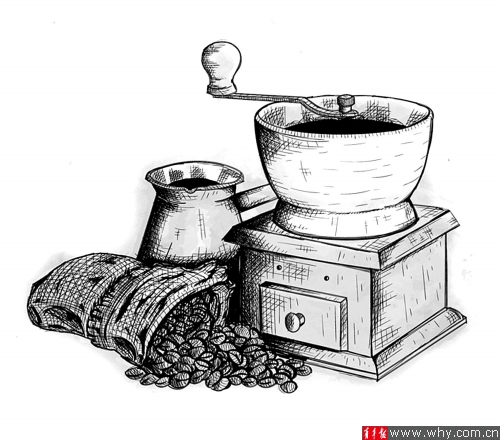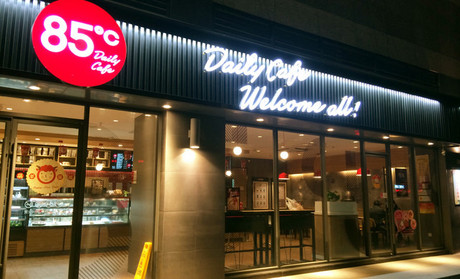Who makes better coffee, people or machines?

Zhou Peijun Painted
In winter, every rush hour and afternoon in the circle of friends will be brushed by a cup of coffee. Tasting coffee is a very personal matter, so discussing what is "good coffee" has always been a complicated matter. At present, the market is still divided into "artificial pie" and "machine pie" two factions, so who is the best coffee?
Youth Daily reporter Chen Shisong
Coffee machine changes to brew coffee in bulk
In the coffee industry, a cup of premium coffee usually means first class beans, first class roasting, first class ground freshness. Each coffee has its own unique flavor, and the perfect cup of coffee should taste bitter mixed with acid and slightly sweet. Too much, or too much emphasis on the natural sweetness of coffee, tends to taste more bitter. If you don't bring enough, you'll make a sour coffee.
Regardless of the method, there are several factors that will affect the final brew anyway. The most important include the amount, fineness and uniformity of coffee powder, the amount of water, temperature and time of contact between water and coffee powder, and how much stirring coffee liquid is subjected to during brewing.
When coffee maker CEC's automatic coffee machine first appeared in boutique coffee shops in 2006, it distinguished itself in two ways: it allowed precise, digital control of coffee brewing variables such as how much water was added, how hot the coffee was and how long the coffee powder was in contact with the water. Second, it only makes one cup of coffee at a time, which makes it feel a bit like a French press. This means that as long as the coffee is carefully prepared, the coffee shop can continuously produce the same quality coffee cup after cup.
The coffee maker stands in sharp contrast to the mass-produced machines used in gas stations, small restaurants and many coffee shops, and is said to help the boutique coffee industry regain confidence in brewing coffee, especially single-cup coffee. Single-cup brewed coffee enables shops to offer a wider range of coffee. "There's no reason to brew coffee in large quantities." said Randy Shullet, co-founder of Coffee Equipment Inc.
Return to manual brewing quality uneven controversial
After Starbucks acquired CEC in 2008, high-end coffee shops abandoned automatic coffee machines in favor of manual brewing-baristas holding long-necked cups and gracefully pouring water into porcelain cups filled with filter paper. However, the disadvantage of artificial brewing is that it is difficult to maintain a constant and uniform quality. Which begs the question: Who makes the coffee better, humans or machines?
Of course, the answer depends on your definition of "good." Uniformity of quality may be a common standard in the coffee industry, and it doesn't matter where you go: McDonald's, Starbucks, Waffle House, or Tim Wendelboe, the world's most famous coffee company, do their best to provide customers with exactly the coffee they expect, every time.
In fact, concerns about uneven quality put the status of handmade coffee brewing in jeopardy. When there are many customers, the barista inevitably takes care of a certain detail, and the finished product is a cup of coffee. Because of this, in recent years, even some high-end elaborate coffee shops have begun to consider a complete switch to coffee machines. The obsession with quality has led to thousands of dollars worth of "hot water taps," which are simply drinking fountains that pump a certain amount of water at a certain temperature for a certain amount of time, and $15,000 coffee makers that brew four cups of coffee at a time. Some coffee shops have switched back to manually operated, automatic, high-volume coffee machines to ensure coffee quality is not spotty.
No wonder uniformity is one of Briggo Coffee Haus 'biggest selling points. Briggo Coffee Haus is a new coffee vending machine that has appeared in Texas in the past two years. In essence, this vending machine is a large coffee robot connected to the cloud. Customers can customize their favorite coffee using Briggo's application level, and then go to a physical machine to get it, or press the button directly on the screen of the physical machine, and then wait for a cup of coffee to be delivered to them. If, as expected, every vending machine sells the same coffee that tastes the same, as companies roll out machines around the world, you'll get the same coffee everywhere.
Here, one of the things the barista does is to constantly adjust the process to the equipment in the store to ensure that each cup of coffee has the best flavor.
Pre-ground coffee tastes more bland
And even the most advanced machines, using the most objective observational data, can only tell how a cup of coffee is brewed, not how it actually tastes. The reason, as a paper in the peer-reviewed journal Food Science and Management points out, is that "the chemical composition of coffee flavor is extremely complex and has not been thoroughly studied."
You can't detect what you don't know, and coffee is estimated to contain at least a thousand aromatic compounds. And even if you can objectively measure the flavor and texture of a cup of coffee, that doesn't tell you how good it is. How coffee tastes, you know."
Although Starbucks is still hiring people to control the standard of coffee brewed, although the amount and thickness of coffee powder can be manually adjusted, each machine is connected to Starbucks 'mainframe through an intranet called CloverNet, and technical updates and new coffees are exchanged with the mainframe in real time. In fact, all the clerk has to do is stir the coffee, and the machine tells you when to stop.
Of course, repeating the same brew cup after cup would make no sense if it tasted like muddy water. Briggo's CEO admits,"the quality of autobrew coffee doesn't have a glorious history." But repeat Briggo's "system makes excellent coffee." Much of that guarantee comes from ingredients: Briggo buys freshly roasted coffee beans from a local coffee roaster in Austin and waits for customers to order them before grinding and brewing. But that said, being able to grind and brew has put Briggo ahead of other companies that use coffee capsules or pre-ground coffee. Pre-ground coffee tastes bland because the freshness of coffee quickly decreases after grinding. As a review article in the scientific journal Fine Coffee Chronicle points out,"Even coffee stored under vacuum or low oxygen conditions undergoes lipid oxidation due to the presence of free radicals generated during roasting." Even Starbucks, which sells coffee capsules and instant coffee, advised Bloomberg Businessweek in an interview that "don't buy pre-ground coffee."
Source: Youth Daily Author: Chen Shisong
Important Notice :
前街咖啡 FrontStreet Coffee has moved to new addredd:
FrontStreet Coffee Address: 315,Donghua East Road,GuangZhou
Tel:020 38364473
- Prev

Quality Cafe: 12 chain stores have been opened to graft O2O platform to reduce costs
The first generation drank instant coffee, the second generation drank espresso coffee, and now let's move on to the third generation drinking hand-brewed specialty coffee. As the ad says, coffee has evolved all the way to the present, and niche boutique coffee has begun to enter people's vision. Founded in 2011, Quality Cafe is positioned at the cutting edge of trends. A cup of fine coffee comes from 60% of the highest quality coffee green beans, 30% of the best roasts
- Next

85C or step coffee to accompany you, general manager Xie Jiannan quit.
The news of the resignation of Xie Jiannan, the general manager of 85C, has aroused widespread concern in the industry. behind the concern is the confusion of enterprises in the face of today's speed and scale of development. During this period, there are both generality and individuality. However, 85 degrees C chose to practice internal skills. Senior executives exit in a high profile and leave sadly, which is a true reappearance of the career of many professional managers. And now there's one more, 8.
Related
- What grade does Jamaica Blue Mountain No. 1 coffee belong to and how to drink it better? What is the highest grade of Blue Mountain coffee for coffee aristocrats?
- What are the flavor characteristics of the world-famous coffee Blue Mountain No. 1 Golden Mantelin? What are the characteristics of deep-roasted bitter coffee?
- Can I make coffee a second time in an Italian hand-brewed mocha pot? Why can't coffee be brewed several times like tea leaves?
- Hand-brewed coffee flows with a knife and a tornado. How to brew it? What is the proportion of grinding water and water temperature divided into?
- What is the difference between Indonesian Sumatra Mantinin coffee and gold Mantinin? How to distinguish between real and fake golden Mantelin coffee?
- What does bypass mean in coffee? Why can hand-brewed coffee and water make it better?
- Unexpected! Ruixing Telunsu lattes use a smoothie machine to foam milk?!
- % Arabia's first store in Henan opens into the village?! Netizen: Thought it was P's
- Does an authentic standard mocha coffee recipe use chocolate sauce or powder? Mocha Latte/Dirty Coffee/Salty Mocha Coffee Recipe Share!
- What is the difference between Vietnam egg coffee and Norway egg coffee? Hand-brewed single product coffee filter paper filter cloth filter flat solution!

